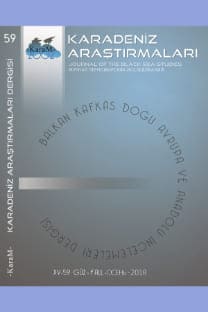XVII. Yüzyıl Macar Millet Anlayışının İdeolojik İçeriği Açısından Bir Örnek: Kuruz Hareketi Ve Askeri Potansiyeli
Osmanlı İmparatorluğu’nun egemenliği altında yaşamış milletlerde milli bilincin toplumun geneli tarafından içselleştirilerek ortak bir sorumluluğa dönüşmesi farklı zamanlarda, değişik şekillerde vücuda gelmiştir. Osmanlı ve Habsburg imparatorluklarına tabiilik, absolutizm ve feodalizm, siyasi bağımsızlık ve vasallık gibi Macar milletinin yazgısını tayin eden etmenlerin neden oldukları krizler ve değişimler bugün dahi tarih biliminin tartışmalı alanlarından biridir. Bu çalışmada XVII. yüzyılın ikinci yarısından itibaren faal olarak baş göstererek gittikçe şiddetlenen Habsburg karşıtı Macar politik ve askeri hareketlerinin milli ve ideolojik yönleri değerlendirilmeye çalışılmıştır. Macar bağımsızlık fikri üzerinde tartışmasız büyük role sahip olduğundan Habsburg-Osmanlı, Osmanlı-Macar, Habsburg-Macar diplomatik ilişkileri de dikkate alınmıştır. Böylelikle Ferenc Wesslényi’nin başlattığı kuruz hareketinden Thököly’nin Orta Macar Kralı seçilmesine kadar olan dönemde verilen mücadelelerin amaç ve beklentileri yansıtılmak istenmiştir. Ayaklanmaların toplumsal arka planının neye dayandığı ve amaçları göz önünde bulundurulurken İmre Thököly’nin devlet ve politika konusundaki duruş noktası, ordu idaresi ve ordusunun düşünsel ve siyasi bileşenleri analiz edilmiştir.
An Example for the Ideological Contents of the Hungarian National Idea in the 17th Century Was the Kuruc Movement and Its Military Force
In case of the Hungarians and other nations which lived under the rules of the Ottoman Empire, the attainment of the national idea and its common responsibility came into existence in different ways and in different period. The elements determined the destiny of the Hungarian nation, such as the dependence upon the Habsburg and the Ottoman Empire, the absolutism, the feudalism, the political independence and the vassalism caused the crisises and changes which are the much-debated questions of the history nowadays, too. In the present study, I would like to present the parts and characteristic feature of the Anti-Habsburg Hungarian national and ideological movements, which ones fought strongly from the 2nd part of the 17th century and got stronger more and more. The Habsburg-Ottoman, the Ottoman-Hungarian and the Hungarian-Austrian relations played an important role in the formation of Hungarian idea of the independence that is why they got a high priority in the present work. The aim of this study is to explore the goals of the fights in period from the Kuruc movement proposed by Ferenc Wesselényi to the appointment of Imre Thököly for the central part of Hungary. I endeavoured to examine both the goals and basis of the social background of the insurrections and Thököly's standpoint related to state and politics, his supremacy activity, ideological and political elements of his army as well.
